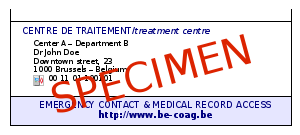What is haemophilia?Haemophilia is an inherited and congenital bleeding disorder that affects almost only males. There are two types of haemophilia: haemophilia A which is caused by a deficiency of coagulation factor VIII, and haemophilia B which is caused by a deficiency of coagulation factor IX.
Whatever the type, the severity of haemophilia is determined by the level of clotting activity of factor VIII or factor IX in the blood. There are three levels of severity: mild, moderate, and severe. The type and level of severity of the disease defines to a large extent the treatment of a specific patient. A person with haemophilia does not bleed faster than anyone else, but bleeding lasts longer. In most cases, external bleeding caused by daily life scratches are minor, just like for a non-haemophilic person: classic compression of the wound is indicated. The main problem for people with haemophilia is internal bleeding, either in the joints (haemarthrosis) and muscles (haematoma), or into soft tissues.
People with severe haemophilia often bleed internally spontaneously: they are usually well aware of the treatment to follow and have the ability to treat themselves. Some people with severe haemophilia, and in particular children, are treated preventively to avoid spontaneous bleeding propensity.
In case of a serious accident and/or unconsciousness of a person with severe, moderate or mild haemophilia, it is crucial that caregivers take into account internal bleeding risks and that they consult as soon as possible a haemophilia centre (preferably the one where the patient is registered) in order to take appropriate measures. | Haemophilia centresEach person with haemophilia has a card with the address and the phone number of their Haemophilia Centre at the back. In case of emergency, please contact the Centre!
 Find a Centre here. |


